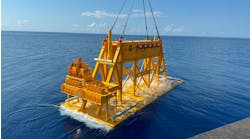Navigating offshore insurance takes adapting to new risks and realities
By Jack Swift, Lockton
As the offshore oil and gas industry continues to evolve, so do the risks and complexities associated with insuring these projects. Lockton's Offshore Projects Practice is keenly aware of the challenges these changes present, especially as the market increasingly focuses on high capex projects and the ongoing volatility in subsea construction.
High capex projects and the insurance market
Offshore projects today are characterized by substantial capex, demanding high insurance capacity to mitigate the risks involved. Oil and gas in particular is a frontier-type industry; the low-hanging fruit has all been picked, and the industry is pushing into ever more remote and demanding environments. Inevitably, this heightens both the risks and the insurance requirements.
In general, Lockton is seeing strong market appetite for the excess layers of large non-subsea placements. However, securing primary coverage remains a challenge, especially as pricing must meet insurer expectations to generate interest.
Hardening of the subsea insurance market
In contrast, subsea construction insurance has become increasingly difficult to obtain, even for projects with modest budgets. This shift is largely due to the sector’s challenging claims history and a lack of insurer leadership options. Notable high profile losses on a number of projects have prompted insurers to reevaluate their participation. These loss records have cast a long shadow, with high-profile claims reminding insurers of the inherent volatility of this segment. As a result, there has been a hardening of the subsea insurance market, a reality that subsea clients cannot afford to ignore.
Premiums have not kept pace with many insurers’ view of the risk profile, leading many insurers to withdraw or reduce their capacity for subsea construction altogether. Among them are major players such as Zurich, Aspen, Swiss Re, and the Norwegian Hull Club, whose absence marks a notable shift in market dynamics and reduction in the available market capacity.
The hesitancy of insurers to underwrite subsea construction is understandable given the track record. Rate reductions over time, paired with substantial claims, have made this a difficult class for many to support. Insurers must now see a compelling case for adequate premiums before they will entertain the idea of covering new subsea ventures. Brokers recognize that a proactive approach, grounded in transparency and high-quality information is essential for engaging insurers effectively.
Balancing ESG considerations
The offshore industry is also facing increased scrutiny around environmental, social and governance (ESG). Insurers are asking more questions, reflecting a need for deeper insights into the environmental impacts and safety protocols associated with projects. The industry is in the midst of a transitional phase, where greener practices are crucial but must be balanced with operational realities.
Underwriters are more focused than ever on the details of risk management. Beyond ESG scores, they need to understand the health and safety protocols, training procedures and overall operational robustness of each project. These elements are now as critical as the environmental credentials, if not more so, given the inherently high-risk nature of offshore projects.
Adapting for the future
Given that 2025 is a year likely to be marked by continued volatility, positioning yourself as a transparent, well-prepared and engaged partner will set you apart. Insurers will always place a premium on high-quality information. In a competitive and challenging market, it is essential for project stakeholders to present a well-documented risk profile and take control of the narrative rather than wait until underwriters start asking questions. This proactive approach not only enhances credibility but also significantly improves chances of securing the best possible terms. This can make a real difference when it comes to negotiating favorable rates and ensuring long-term support for projects.




